 W
WAmazing Island is a video game developed by Ancient and Hitmaker and published by Sega for the GameCube. It was released in Japan on January 15, 2004, and in North America on August 25, 2004.
 W
WBishi Bashi is a series of video games by Konami for arcades, mobile phones, PlayStation and Windows. All games in the series comprise playing through a wide variety of competitive minigames against other players. The arcade games support 1 to 6 players and the PlayStation game allows 1 to 8 players; the game will provide computer opponents if there are not enough players.
 W
WBrain Exercise with Dr. Kawashima is a brain training game developed by Namco Bandai and tested by Dr. Kawashima, known for his Nintendo DS games Brain Age: Train Your Brain in Minutes a Day! and Brain Age 2: More Training in Minutes a Day!.
 W
WCharlotte's Web is a 2006 adventure game based on the movie of the same name. Developed by Backbone Entertainment, it was released by Sega for Game Boy Advance, Nintendo DS, and Microsoft Windows. A separate version for PlayStation 2 was developed by Atomic Planet Entertainment and published by Blast! Entertainment in 2007, only in Europe.
 W
WCrafting Mama, known in Japan as Craft Mama and in the PAL region as Cooking Mama World: Hobbies and Fun, is a crafting simulation-styled minigame compilation video game developed by Cooking Mama Limited that was released on Nintendo DS during October 2010. It is a spin-off from the Cooking Mama series.
 W
WDeca Sports is a sports video game for the Wii developed by Hudson Soft. It is a collection of ten different sports simulations controlled with the Wii Remote.
 W
WDilbert's Desktop Games is a collection of Dilbert-related games for Microsoft Windows.
 W
WFall Guys: Ultimate Knockout is a platform battle royale game developed by Mediatonic and published by Devolver Digital. It was released for Microsoft Windows and PlayStation 4 on 4 August 2020. The game is planned for eventual release on Nintendo Switch, Xbox One, and Xbox Series X/S.
 W
WFive Nights at Freddy's: Help Wanted is a 2019 virtual reality survival horror video game developed by Steel Wool Studios and published by Lionsgate Games and ScottGames for Microsoft Windows, PlayStation 4, Xbox One, Nintendo Switch, iOS, and Android. The game is the seventh installment in the Five Nights at Freddy's series, following Ultimate Custom Night (2018), and presents itself as "The Freddy Fazbear Virtual Experience", produced for the fictitious corporative entity Fazbear Entertainment to help improve its public image after a series of debilitating lawsuits, following several incidents and disasters that allegedly occurred at their various locations.
 W
WFood Network: Cook or Be Cooked is a cooking simulation-styled minigame compilation developed by American studio Red Fly Studio and published by Namco Bandai Games. It was released exclusively in North America on November 3, 2009, and is the first video game to use the Food Network license.
 W
WFrankie Goes to Hollywood is a computer game that was developed by Denton Designs and published by Ocean Software Ltd in 1985 for the Commodore 64, Amstrad CPC and ZX Spectrum home computers. The game is based on music, imagery and slogans of the UK band Frankie Goes to Hollywood.
 W
WFuru Furu Park is a collection of minigames for the Wii. It was developed and published by Taito and was originally planned for a release in Japan for the Wii launch, but was pushed back to April 19, 2007. The minigames are inspired by classic Taito arcade games. Majesco Entertainment published the title in the US on January 16, 2008. There are 2 single-player modes and 3 multi-player modes. It has 30 minigames to play.
 W
WThe Game Boy Camera (GBC), released as Pocket Camera in Japan, is a Nintendo accessory for the handheld Game Boy game console. It was released on February 21, 1998, in Japan, and manufacturing was ceased in late 2002. As a toy for user-generated content, it can be used to shoot grayscale photographs, edit them or create original drawings, and transfer images between GBC units or to the 64DD art game suite Mario Artist. The accessory featured a 180°-swivel front-facing camera that allowed users to capture selfies. Its images can be printed to thermal paper with the Game Boy Printer. The GBC's cartridge contains minigames based on Nintendo's early games such as the arcade video game Space Fever and the Game & Watch handheld game Ball, and a chiptune music sequencer. Guinness recognized it as the world's smallest digital camera in 1999, and photographers have embraced its technological limitations as artistic challenges.
 W
WThe Garfield Show: Threat of the Space Lasagna is a video game based on the France 3 television series The Garfield Show, developed by French studio Eko System. It is the first video game based on the series and was released Summer 2010 for the Wii. The game supports the Wii Balance Board and the Wii Motion Plus. In December 2011, it was released on Microsoft Windows and Nintendo DS exclusively in Russia.
 W
WGhoul Panic is a 1999 light gun shooter arcade game developed by Eighting/Raizing and published by Namco. A version for the PlayStation was released in 2000. Players used lightguns to complete a series of minigames, done by firing at on-screen targets. In these minigames are a quota that must be fulfilled before the time runs out to progress such as shooting a certain amount of enemies or protecting small, yellow cats from projectiles. It ran on the Namco System 12 arcade hardware.
 W
WHelp Wanted is a game that features a collection of various, Wii Remote-based minigames. The game offers a story mode, quick play mode, and multiplayer mode. However, only 15 of the 50 jobs can be played in multiplayer mode. The game is developed and published by Hudson Soft and was released in Japan for Nintendo's Wii on November 27, 2008, in Europe on March 13, 2009, in Australia on March 27, 2009, and in North America on May 12, 2009.
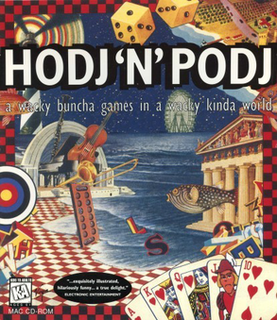 W
WHodj 'n' Podj is a 1995 computer board game and minigame compilation developed by Boffo Games and published by Media Vision and Virgin Interactive. It was designed by Steve Meretzky, previously known for adventure games such as The Hitchhiker's Guide to the Galaxy. Hodj 'n' Podj features 19 minigames based on peg solitaire, Pac-Man, Battleship and other games. These may be played separately or within an overarching fairy tale story, which follows the suitors Hodj and Podj in their attempts to rescue two princesses.
 W
WHot Pixel is a puzzle video game for the Sony PlayStation Portable developed by French studio zSlide, released on 22 June 2008 in Europe and 2 October 2007 in the North America by Atari.
 W
WThere are several Hugo video games based on early episodes of ITE's television show Hugo and are a part of the international Hugo franchise. From 1992 to 2000, ITE developed and released versions for Amiga, Commodore 64 and PC, as well as for PlayStation consoles, exclusively for European markets. Since 2011, Krea Media / Hugo Games has published a series of mobile game remakes for Android. Online slot machine adaptations were also released in 2016 and 2018.
 W
WiCarly is a 2009 party video game loosely based on the TV series of the same name. The Wii version of the game was developed by Blitz Games, while the Nintendo DS version was developed by Human Soft. The game was released in North America for the Nintendo DS on October 27, 2009, and for the Wii on October 20, 2009. Both versions were also released in Europe and Australia in November 6, 2009.
 W
WIce Age 2: The Meltdown is a 2006 video game based on the film of the same name. It was developed by Eurocom and published by Vivendi Universal Games. It was released for PlayStation 2, GameCube, Xbox, Wii, Game Boy Advance, Nintendo DS, and Windows. The Wii version was released as a launch title for the console in Europe.
 W
WThe Improv Presents: Don't Quit Your Day Job is a 1996 adventure game developed by Philips Interactive Media, Inc. and published by Improvisation ManyMedia.
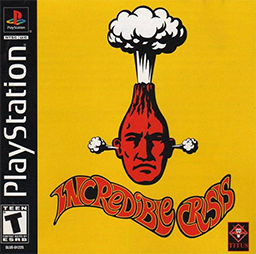 W
WIncredible Crisis, known in Japan as Tondemo Crisis! , is a PlayStation video game developed by Polygon Magic. The game was published in Japan by Tokuma Shoten on June 24, 1999. Translated versions were released by Titus Interactive in North America and Europe throughout November 2000.
 W
WJackass: The Game is a video game based on the television series Jackass. It was developed under license by Sidhe for the PlayStation 2 and PlayStation Portable. The Nintendo DS version of the game was developed by Sensory Sweep Studios.
 W
WJurassic Park Interactive is an action video game based on the 1993 movie Jurassic Park. It was released in North America on May 10, 1994 exclusively for the 3DO Interactive Multiplayer by Universal Interactive Studios. Jurassic Park Interactive was the first video game released by Universal Interactive Studios.
 W
WKinect Adventures! is a sports video game released by Microsoft Game Studios for the Xbox 360. Released in 2010, it is a collection of five adventure and sports minigames and was developed by Good Science Studio, a subsidiary of Microsoft Game Studios. The game utilizes the Kinect motion camera and was offered as a pack-in game with the console. It was unveiled at the 2010 Electronic Entertainment Expo and went on to become the best-selling game on the Xbox 360, selling 24 million units worldwide.
 W
WKinect: Disneyland Adventures is a 2011 open world video game developed by Frontier Developments and published by Microsoft Studios on Kinect for Xbox 360, with a remaster for Xbox One and Microsoft Windows developed by Asobo Studio released in 2017. It takes place in a recreation of Disneyland Park in Anaheim, California circa 2011, with themed games in place of many of the rides, while motion controls are used to play the game.
 W
WKirby Super Star, released as Kirby's Fun Pak in PAL regions, is a 1996 platforming video game developed by HAL Laboratory and published by Nintendo for the Super Nintendo Entertainment System, part of the Kirby series of platforming video games by HAL Laboratory. The game was advertised as featuring eight games: seven short subsections with the same basic gameplay, and two minigames.
 W
WThe Lab is a virtual reality (VR) video game developed by Valve and released for Windows on April 5, 2016. It uses VR technology to showcase a series of play experiences accessed through a hub room. The game is set in the Portal universe and offers eight different game types that involve short demo experiences that use different aspects of the VR capabilities. Variety is also offered beyond the experiences themselves by the amount of interactability with objects in the environment that is included.
 W
WLazy Jones is a platform game for the Commodore 64, ZX Spectrum, MSX and Tatung Einstein. It was written by David Whittaker and released by Terminal Software in 1984. The Spectrum version was ported by Simon Cobb.
 W
WLego Island is a Lego-themed action-adventure game developed and published by Mindscape. It was released for Microsoft Windows on September 26, 1997, as the first Lego video game outside Japan. It received positive reviews and inspired several preservationists and other fans, and was followed by two sequels: Lego Island 2: The Brickster's Revenge (2001) and Island Xtreme Stunts (2002).
 W
WLittle Deviants - is a minigame compilation, developed by Bigbig Studios for the PlayStation Vita. The game was released on 17 December 2011 in Japan, 15 February 2012 in North America, and 22 February 2012 in Europe as a launch title for the PlayStation Vita. Little Deviants is composed of 30 minigames that make use of the Vita's front multitouch touchscreen, rear multitouch touchpad, Sixaxis motion controls, and augmented reality capabilities, along with traditional controls. Little Deviants is Bigbig's last game since Sony Computer Entertainment announced the studio's closure on 10 January 2012.
 W
WMario Party: The Top 100, known in Japan as Mario Party 100 Minigame Collection , is a party video game developed by NDcube and published by Nintendo for the Nintendo 3DS. It is the fifth installment in the handheld series of Mario Party games and is primarily a compilation of 100 minigames from across the series. It was released first in North America in November 2017, and was released in PAL regions and in Japan in December 2017. It is the third and final Mario Party game for the Nintendo 3DS family of systems. A similar entry on the Nintendo Switch, Mario Party Superstars, was announced and released in 2021.
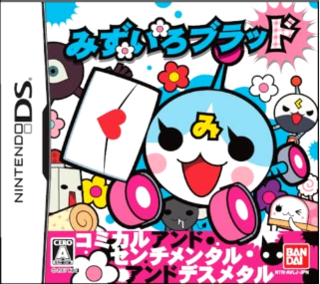 W
WMizuiro Blood is a hybrid edutainment/minigame compilation video game developed and released in Japan for the Nintendo DS by Namco Bandai Games in 2007.
 W
WMr. Bones is a multi-genre video game conceptualized by E. Ettore Annunziata, developed by Zono and published by Sega for the Sega Saturn in 1996. The soundtrack to Mr. Bones was composed and performed by Ronnie Montrose, with cutscenes and art assets done by Angel Studios.
 W
WNintendo Land is a party video game developed and published by Nintendo as a pack-in launch title for the Wii U home video game console in 2012. The game was first announced at E3 2012 during Nintendo's press conference.
 W
WNuman Athletics is a 1993 competitive sports arcade game developed and released by Namco. It runs on the company's NA-2 hardware, and has eight unusual competitions to test the strength and might of four mutant athletes called "Numans". Up to four people can play simultaneously. The game later went on to spawn a sequel, Mach Breakers: Numan Athletics 2, in 1994; it featured seven brand-new Numans.
 W
WPanic Park is an arcade game developed and published by Namco in 1998, and released on the arcade system board Namco System 23 in dedicated cabinets with 33" or 50" monitors.
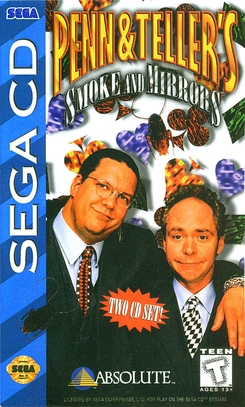 W
WPenn & Teller's Smoke and Mirrors is an unreleased video game starring the magician duo Penn & Teller that was planned for release initially on the Sega CD in April 1995. The game is a collection of several minigames and an adventure platform game. All the minigames, with one exception, were made for the sole purpose of enabling the player to fool their friends by different means, designating the games "scam minigames" and virtual tricks. Penn & Teller's Smoke and Mirrors is similar to the video Penn & Teller's Cruel Tricks for Dear Friends, which has the same purpose, and uses properties of the video medium itself for the tricks.
 W
WPillar is an independent video game designed by Michael Hicks for PlayStation 4, Xbox One and PC. Described as a collection of minigames where each game represents a different type of personality found in people, each level in Pillar has different gameplay mechanics to examine various personality traits and themes. Reviewers noted the game's exploration of themes such as love, religion, capitalism, aging and regret.
 W
WThe Playroom is a casual video game that is a collection of augmented reality mini-games. It was developed by Japan Studio's Team Asobi division, comes pre-loaded on all PlayStation 4 consoles, and is meant to demonstrate the use of the PlayStation Camera and the DualShock 4 controller. The PlayStation Camera accessory is required to play The Playroom. If a camera is not present, a trailer for The Playroom will be displayed instead of the full game. Firesprite, a studio founded by former employees of Studio Liverpool, worked on the visuals of The Playroom. Downloadable content is free.
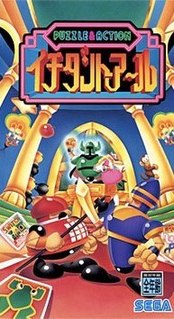 W
WPuzzle & Action: Ichidant-R (also known as just Ichidant-R is a puzzle video game developed and released by Sega in 1994 for the Sega System C-2. It is the sequel to Puzzle & Action: Tant-R and is the second of the Puzzle & Action series. Gameplay is similar to Tant-R: the player must complete a series of mini-games, although its crime theme is replaced with a medieval theme. The detectives from the first game return and play the role of knights in a theatre play. An English version of the game exists, which replaces the Japanese voices with English voices. The Korean version also uses the English voices. The game was ported to the Sega Game Gear in 1994, Mega Drive in 1995, and released on the Sega Ages Rouka ni Ichidant-R compilation for the Sega Saturn. The game was released for the Wii Virtual Console in 2007. All console versions except for the Switch version are Japanese exclusives. The third and final game in the series, Puzzle & Action: Treasure Hunt, was released in 1995.
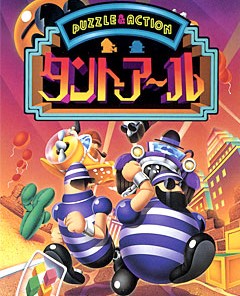 W
WPuzzle & Action: Tant-R, is a puzzle video game developed and published by Sega in 1993 for the Sega System C in Japan. The first instalment in the Puzzle & Action trilogy, it is a spin-off of Bonanza Bros.. The characters from Bonanza Bros., Robo and Mobo, are featured as protagonists, functioning as detectives. A prison escapee is chased, and his henchmen interfere. A series of timed mini-games must be completed to defeat the henchmen. The game features references to western culture.
 W
WPuzzle & Action: Treasure Hunt, known in Japan as Puzzle & Action: Nidoarukoto wa Sand-R (2度あることはサンドア〜ル), and as Puzzle & Action: Sand-R , is a puzzle video game released for the Sega Titan Video in 1995, and ported to the Japanese Sega Saturn by CSK Research Institute Corp. in 1996. The Saturn version was re-released for the Satakore range in 1998. Puzzle & Action: Treasure Hunt is the third and final instalment in the Puzzle & Action series, after Puzzle & Action: Tant-R and Puzzle & Action: Ichidant-R. Like the previous games, players play a series of timed mini games to overcome enemies. Two players are supported.
 W
WRatatouille: Food Frenzy is a cookery simulation-styled minigame compilation video game developed by Helixe and published by THQ for the Nintendo DS. It was released in North America on October 29, 2007, in Europe on February 15, 2008, and in Japan on February 21, 2008. It is based on the film Ratatouille.
 W
WRudolph the Red-Nosed Reindeer is a video game based on the television special of the same name. The game was released by Red Wagon Games for both Wii and Nintendo DS on November 9, 2010. However, the developers of the two versions differ: the Wii game was developed by High Voltage Software while the developer of the DS version is American studio Glyphic Entertainment. In this game, the players compete in four different minigames, with each game having its own motion controls. Each minigame has a time limit. Once the time limit is up, the minigame is finished. Up to two players can participate at a time. The game has faced generally negative reviews from sites such as IGN.
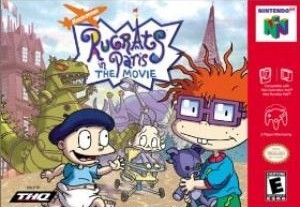 W
WRugrats in Paris: The Movie is a name of several video games based on the movie of the same name from the Nickelodeon animated series, Rugrats. The game follows the adventures of a group of young children in a European theme park. A console version of the game was released in 2000, for the PlayStation, Nintendo 64, and a handheld version for Game Boy Color. A version for Microsoft Windows was later released in 2001. A Sega Dreamcast version of the game was planned to be made and planned for release in 2001, but it was later cancelled during the middle of development and would have been the first Nickelodeon game released for the system. The console version’s gameplay is similar to Rugrats: Studio Tour, but Paris’ attractions sometimes have minigames too. The handheld gameplay is a side-scrolling platformer. The Microsoft Windows’ gameplay is an adventure game in which the player has to find Chuckie’s Wawa Bear.
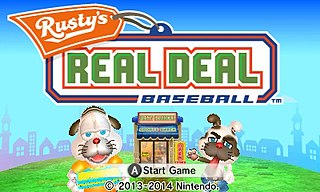 W
WRusty's Real Deal Baseball is a free-to-play baseball video game published by Nintendo for the Nintendo 3DS eShop. It was released in Japan in August 2013 and in North America in April 2014.
 W
WSmart Games Challenge is a video game series developed by American companies KnowWare and Smart Games. Three games were released between 1996-8.
 W
WSpace Jam is a sports video game that ties in with the film of the same name, and based on Looney Tunes characters by Warner Bros. It was released for the Sony PlayStation and Sega Saturn consoles, and MS-DOS computers. Unlike the film and real rules of basketball, each team plays 3-on-3. Players have a choice whether to play as the TuneSquad or the Monstars. It features basic controls and 2D graphics. The game was developed by Sculptured Software, who coincidentally had developed the Looney Tunes-based basketball game Looney Tunes B-Ball for Sunsoft the year prior to the production of the Space Jam film, and published by Acclaim Entertainment, who coincidentally had been publishing the NBA Jam series of wacky-themed basketball games.
 W
WStar Warped is a first-person point-and-click adventure video game that parodies the Star Wars universe, specifically the original trilogy released between 1977 and 1983: Star Wars, The Empire Strikes Back, and Return of the Jedi. It was created by Parroty Interactive, which was a division of the game's publisher, Palladium Interactive. Star Warped was released in the United States and Canada, for both Windows PC and Macintosh, in late 1997 as a follow-up to their debut Myst parody, Pyst. The game is no longer in release, as Parroty's parent company folded after being bought by The Learning Company in 1998. The game invited players to "Be seduced by the power of the Dork Side". Star Warped received mixed reviews from critics: some praised the game's variety, originality, and humor, while others dismissed it as lazy, unfunny, and dull.
 W
WSukeban Shachou Rena is an action video game developed by Dearfield and published by Jorudan for the Wii console, exclusively available in Japan.
 W
WThe Three Stooges is a video game released by Cinemaware in 1987 for the Amiga based on the comedy trio of the same name. Players control Stooges Moe, Larry, and Curly in minigames based on Stooges films with the aim of raising enough money to save an orphanage. It was ported to the Apple IIGS, Atari ST, Commodore 64, MS-DOS, NES and Game Boy Advance. The game has been praised as a faithful adaptation of the Stooges films, but has been criticized for repetitive gameplay and limited replay value.
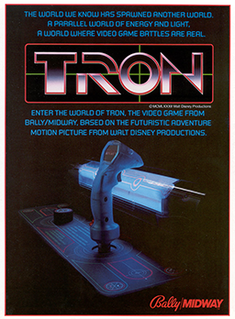 W
WTron is a coin-operated arcade video game manufactured and distributed by Bally Midway in 1982. The game consists of four subgames inspired by the events of the Walt Disney Productions motion picture Tron released earlier in the summer. The lead programmer was Bill Adams. The music programmer was Earl Vickers.
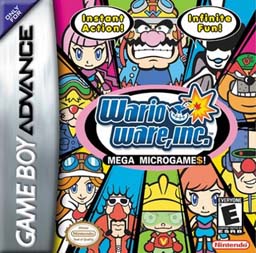 W
WWarioWare, Inc.: Mega Microgames!, stylized as WarioWare, Inc.: Mega Microgame$! and known as WarioWare, Inc.: Minigame Mania in the PAL regions, is a minigame compilation video game developed by Nintendo R&D1 and published by Nintendo for the Game Boy Advance. The debut title in the WarioWare series, the game is about rapid completion of "microgames", short minigames given to the player consecutively and with increasing speed per each game complete. The game's concept was inspired by the "Sound Bomber" mode of Mario Artist: Polygon Studio for the Nintendo 64DD. The music and sound effects were recycled from Wario Land 4. The game was produced by Takehiro Izushi and directed by Hirofumi Matsuoka. Matsuoka was also the director of Polygon Studio. Mega Microgames! was released in 2003; in Japan in March, in North America and Europe in May and in Australia in June.
 W
WWii Fit is an exergaming video game designed by Nintendo's Hiroshi Matsunaga for the Wii home video game console. It is an exercise game with several activities using the Wii Balance Board peripheral. As of March 2012 Wii Fit was the third best selling console game not packaged with a console, with 22.67 million copies sold.
 W
WWinx Club: Magical Fairy Party is a 2012 video game from Nickelodeon. It was released by D3Publisher on October 30, 2012, for the Nintendo DS and received positive reviews. The game is based on the CGI-animated episodes of Winx Club that were co-produced by Nickelodeon. It was part of a two-game partnership between Nickelodeon and D3Publisher, with the other game being Victorious: Taking the Lead.
 W
WWork Time Fun, known in Japan as Baito Hell 2000 is a video game developed by D3 and Sony for the PlayStation Portable. The English title is a play on the slang "WTF", short for 'What The Fuck?', indicating confusion.
 W
WX-Fools: The Spoof Is Out There is an interactive comedic 1997 video game developed by Parroty Interactive. Not to be confused with a radio show series of the same title which aired on Beacon Radio sometime during the mid-1990s.